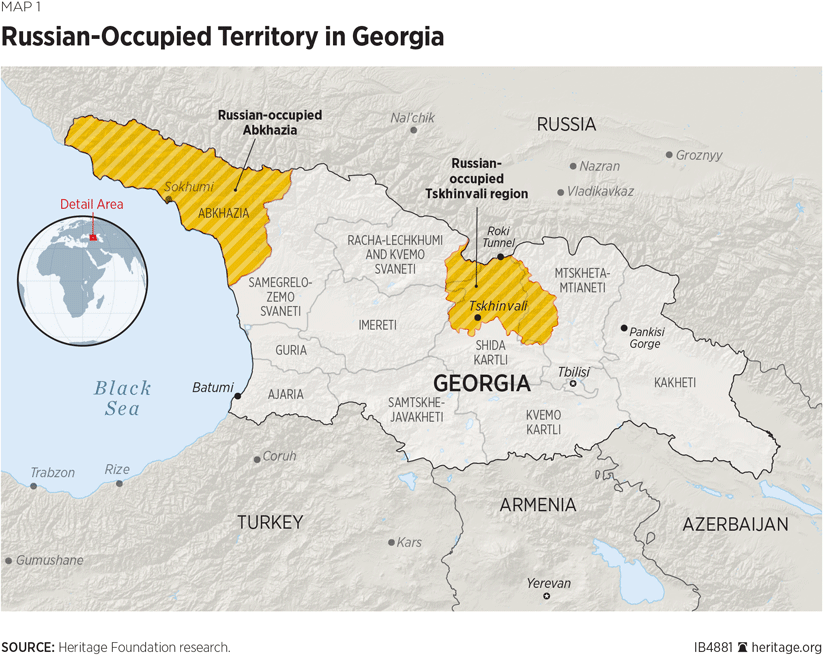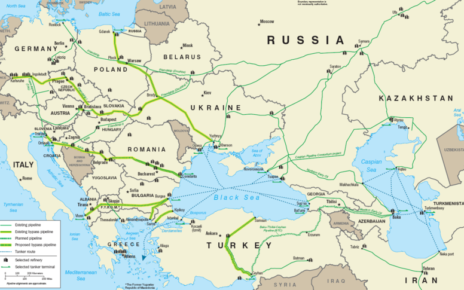This article focuses on defence and security issues on the one hand and, on the other hand, on the related questions of the economy, trade and energy. These are two of the four issue-areas that the U.S.–Georgia Charter on Strategic Partnership, established in 2009, identified as priority areas of the bilateral cooperation. The others are democracy and cultural exchanges.
The Charter could be a vehicle for realizing Georgia’s national interests, should the government seek to re-invigorate it. Indeed, Georgia could rather easily increase possibilities open to Western security arrangements in its region in general, both European and American, if it expressed the wish to do so.
Georgia as a Strategic Crossroads
Georgia is located at a strategically important crossroads in the South Caucasus. It lies on one of the most significant energy transit routes of the post–Cold War era: the southern route for oil and natural gas exiting the Caspian Sea basin to Mediterranean, European and world markets. Georgia’s successful state-building has greatly increased its strategic and geopolitical significance over the last two decades.
The country is a key strategic pivot for Western access eastward to Central Asia and Afghanistan, as well as for the westward transmission of Eurasia’s energy resources. In particular, the new energy infrastructure of the Southern Gas Corridor, bypassing Russia and undermining Moscow’s hegemonic aspirations in the South Caucasus, is of great significance to Europe and the United States.
The weakening relationship between the United States and NATO, on the one hand, and Turkey, on the other hand, makes a new focus on bilateral and multilateral security arrangements necessary for Washington. That is where Georgia could play an irreplaceable role.
Georgia’s strategic importance to Europe and the United States, together with the challenges posed by the present leadership in Turkey, makes it timely to open a dialogue about NATO; however, the greatest fear is that Georgia might invoke an Article 5 claim, since Russia occupies sovereign Georgian territory.
Georgia, NATO and the United States
It would be possible that the whole of Georgia’s internationally recognized territory is included in the invitation to join NATO, while Article 6 is amended to exclude temporarily those occupied territories from NATO’s Article 5 protection.
In this scenario, Georgia would join NATO, but only regions of Georgia not under Russian occupation will get the Alliance’s security guarantee. The 1952 accession protocol for Turkey and Greece establishes a precedent for proceeding in this manner. Similarly, the U.S. territory of Guam and the U.K. territory of the Falkland Islands are outside Article 5 security guarantees.
There is a necessary intermediate step between where Georgia is today and where it prefers to be as a member of NATO. Mutually beneficial, bilateral U.S.–Georgia security arrangements have a greater immediate potential for positive results, after which Georgia’s membership of NATO may be considered at the appropriate time.
NATO membership would be a marathon rather than a sprint. There is a better chance of near-term success for integrating Georgia into multiple NATO/Pentagon instrumentalities, with the ultimate aim of on-going cooperation, creating NATO-compatible armed forces that are skilled, effective and deployable in any given situation and region
The potential for a bilateral U.S.–Georgia defence treaty to lead to NATO membership should not be discounted. One can come before the other.
Another interesting possibility is that Georgia becomes a member of a prospective Southern Tier strategy in the Mediterranean/Black Sea region, on the model of the Nordic Defence Cooperation (NORDEFCO) in the Baltic/North Sea region. NORDEFCO cooperation includes NATO non-members Finland and Sweden as well as NATO members Denmark, Iceland and Norway.
NORDEFCO has a rigorous structure of both political and military cooperation, as well as five operational military cooperation areas, that could serve as a template for creating an analogous structure on the Southern Flank. Were this to be established with Georgian participation, it would not need to be mutually exclusive of any formal bilateral security relationship with the United States.
Georgia and the Southern Gas Corridor
The Trans-Caspian Gas Pipeline (TCGP) is a unique chance to secure U.S. and Western economic advantage and political influence. As erstwhile European Commission Vice-President for the Energy Union Maros Šefčovič explained in December 2017, the TCGP project is dedicated to complement the Southern Gas Corridor by taking gas from Central Asia directly into European Union markets.
Moreover, from the standpoint of Tbilisi, the process of its implementation would consolidate necessary reforms in Georgia. The success of these reforms would then redound to all-around Georgian, European and American commercial and geo-economic advantage, particularly given Georgia’s Deep and Comprehensive Free Trade Agreement with the European Union.
The TCGP is a strategic project for both Georgia and the West, comparable to the Baku-Tbilisi-Ceyhan (BTC) oil pipeline agreed 20 years ago, that now runs from Azerbaijan through Georgia to Turkey’s southeastern coast on the Mediterranean Sea. Just as the BTC enabled Georgia to implement domestic post-Soviet reforms 20 years ago, so today the TCGP would help to promote further Georgian economic reforms that are still necessary.
The TCGP is also a demonstration project. Just as the BTC made possible the European Union’s entire Southern Gas Corridor from the Caspian Sea to Greece and Italy, so the TCGP would also be a “demonstration project” signalling to international investors and financial institutions that other trans-Caspian energy projects have become possible.
Indeed, the TCGP would only help to ensure the implementation of the reforms set out by Prime Minister Mamuka Bakhtadze for Georgia’s energy sector. It is even possible to suggest that the TCGP would assure the success of those reforms, because introducing natural gas from Turkmenistan into the Georgian gas transmission system would diversify Georgia’s own sources of supply.
Such a development would guarantee its energy security and, in particular, promote the liberalization of the country’s gas market regulation. That liberalization is a policy goal of the Government of Georgia, motivated by its accession to the Energy Community, which signifies its intention to implement a system that is consonant with European Union regulatory norms.
Conclusion
The TCGP would stabilize the international situation where Georgia finds itself, also constructively extending Western influence onto the eastern shore of the Caspian Sea. Given Russia’s concerns over the expansion of influence by China and Iran in what it considers to be its own traditional “back yard”, Moscow may even welcome a Euro-Atlantic influence there to counterbalance them.
The signature of the Convention on the Legal Status of the Caspian Sea last August sets the stage for that, by establishing the parameters beyond which Western influence could not grow. There could therefore easily be a tacit confluence of interest between Russia and the United States, to limit Chinese and Iranian influence in the region of the extended Caspian Sea basin, including its eastward stretch into Central Asia and its westward stretch towards the Black Sea basin.
Featured Image: Russian Occupied Territory in Georgia. Via. Helsinki Commission of the U.S. House of Representatives
Disclaimer: Any views or opinions expressed in articles are solely those of the authors and do not necessarily represent the views of the NATO Association of Canada.




